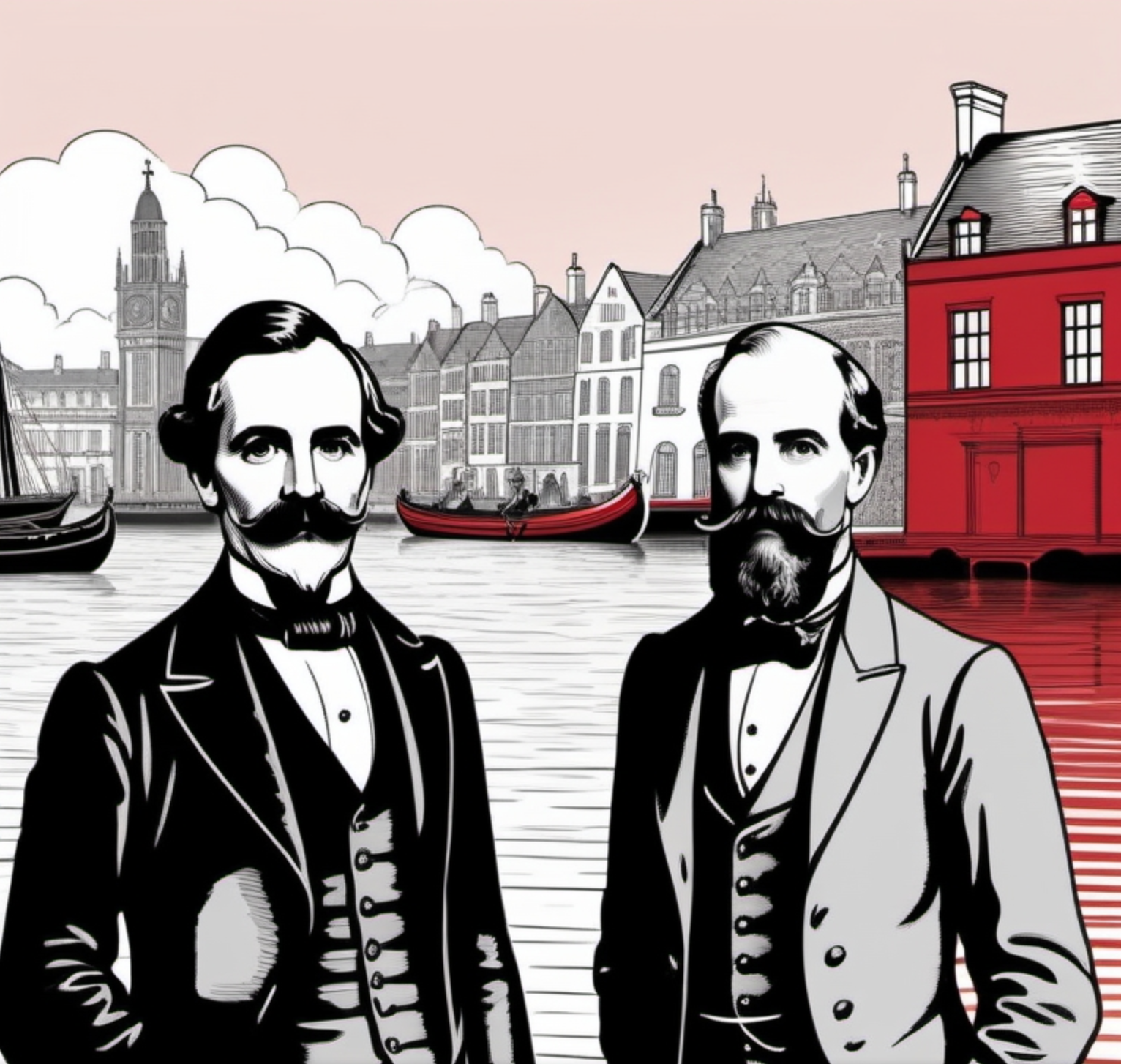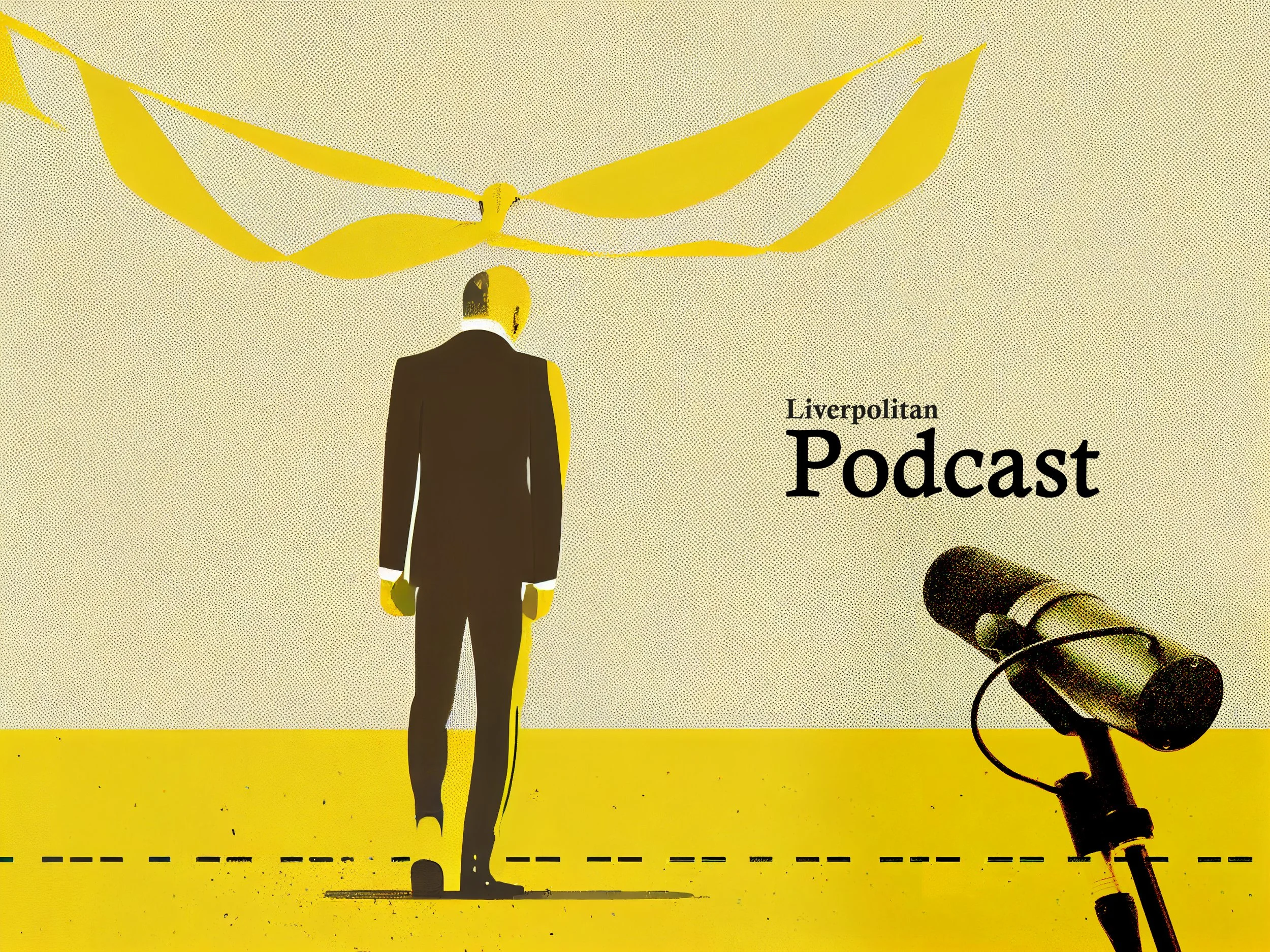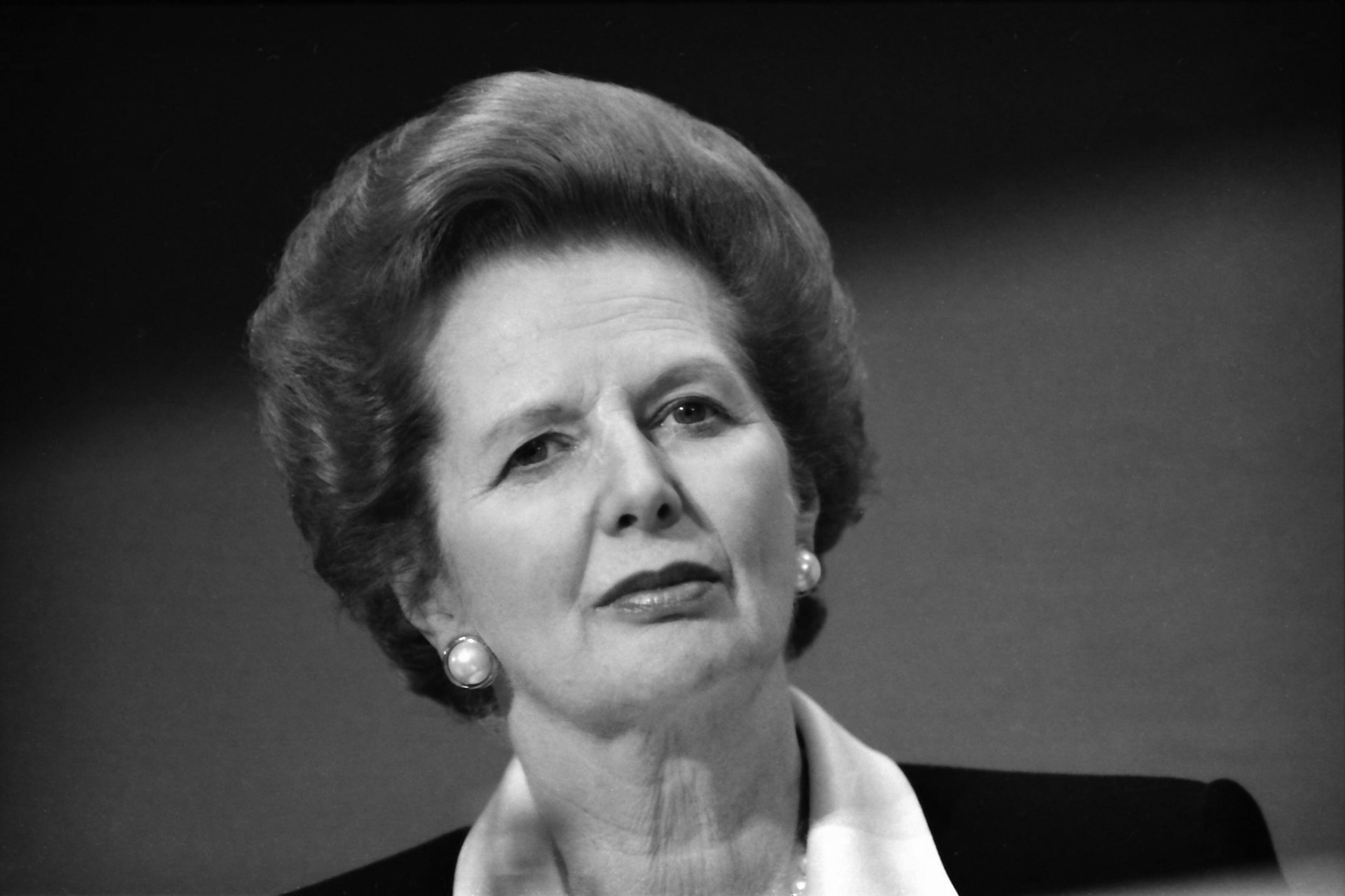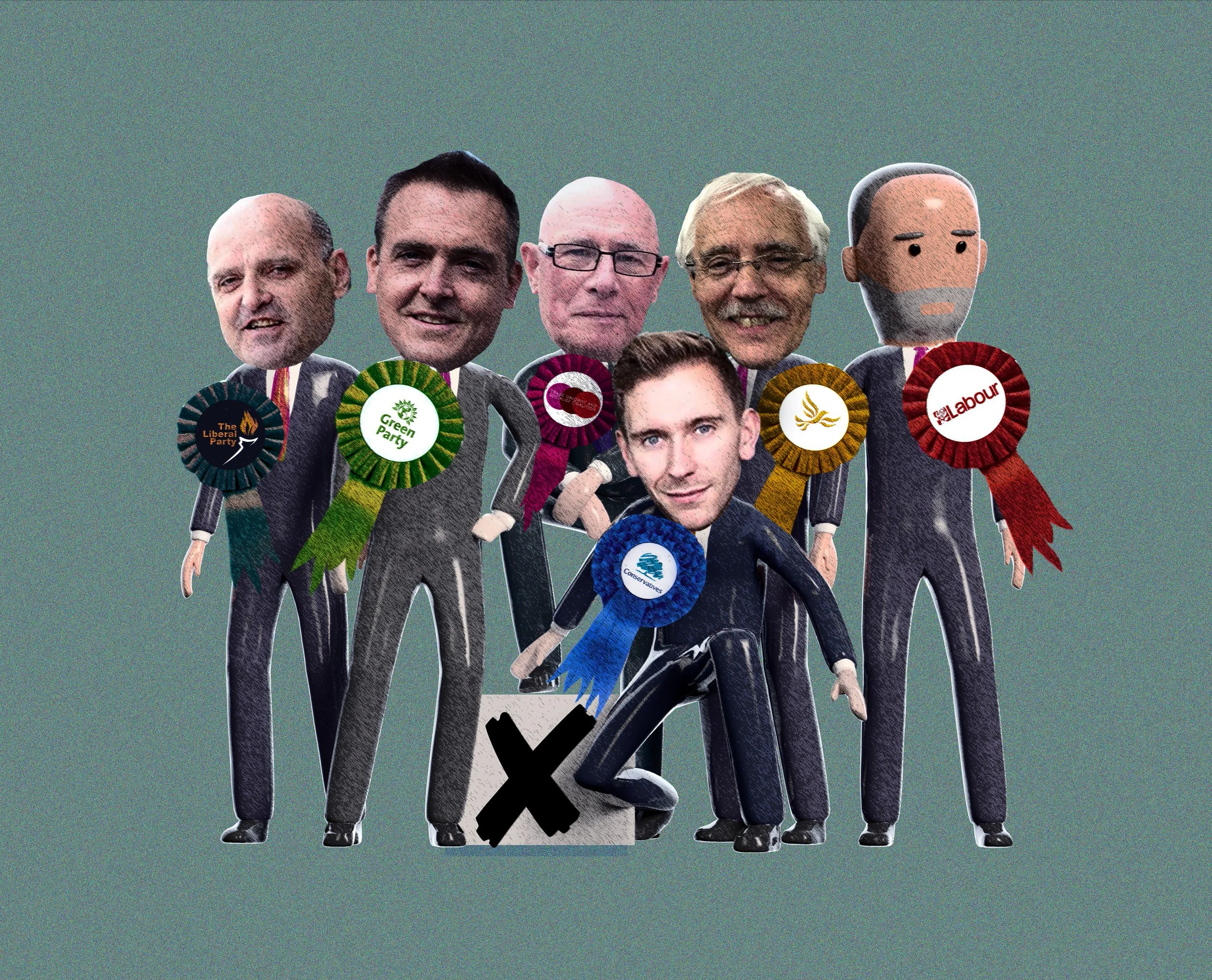Recent features
Taylor Town Kitsch, Ersatz Culture and the Art of Forgetting
As Liverpool rolled out the red carpet for Taylor Swift, America's biggest pop star and her hordes of cowboy hat-clad 'Swifties' , the city's culture chiefs congratulated themselves on the global media coverage. 'This is who we are' seemed the message. But in this time of forgetting, John Egan wonders, is kitsch really who we are and what we want to be?
“If we don't know where we are, we don't know who we are,”
Jon Egan
It may seem perverse to even pose this question, especially as Liverpool was only recently judged by Which? as the UK's best large city for a short break by virtue of its “fantastic cultural scene”. But ask it I must. Despite once proudly wearing the title of European Capital of Culture of 2008, is Liverpool really a cultural city? To paraphrase the BBC's celebrated Brains Trust stalwart, C.M Joad, I suppose it all depends on what you mean by culture?
My worry is that Liverpool appears to be operating under an increasingly narrow and debilitating definition of culture, or at least, offering to the world a version of its cultural self that seems weirdly stunted, shallow and ultimately synthetic - something the American art critic and essayist, Clement Greenberg might have characterised as ‘kitsch’. Writing in 1939, Greenberg's essay 'The Avant-Garde and Kitsch' defined the latter as embracing popular commercial culture including Hollywood movies, pulp fiction and Tin Pan Alley music. He saw kitsch as a product of rapid industrialisation and urbanisation, which created a new market for “ersatz culture destined for those who, insensible to the values of genuine culture, are hungry nevertheless for the diversion that only culture of some sort can provide.” These mass-produced consumer artifacts, by definition formulaic and for-profit, had driven out "folk art" and authentic popular culture replacing it with what were essentially commodities.
One does not have to be a Marxist (Greenberg was) or a cultural snob (he was possibly one of those as well) to be slightly worried that Liverpool's cultural brand is beginning to lean too heavily in the direction of the kitsch and the hyper-commercial. It was a concern, first articulated in the run-up to Liverpool's hosting of Eurovision last year by the Daily Telegraph’s Chris Moss, “Liverpool has chosen Eurovision kitsch over protecting its history and heritage”, and explored further in my Liverpolitan article, “Liverpool's Imperfect Pitch”. A feeling that has only been exacerbated by the recent Taylor Town phenomenon.
For the somehow blissfully unaware, Taylor Town was a “fun-filled” council-funded initiative to transform the city of Liverpool into a Taylor Swift “playground” designed to offer a “proper scouse welcome” to the American pop star and her legion of fans before three sell-out shows at the Anfield stadium. This included commissioning eleven art installations each symbolising one of the artist’s 11 albums – everything from a moss-covered grand piano to a snake and skull-clad golden throne – all designed to be instantly instagrammable.
A golden throne inspired by Swift's 'Reputation' era forms part of Liverpool's Taylor Town trail conveniently located for lunch options. Image: Visit Liverpool.
Sure, Liverpool wasn't the only port of call on Taylor Swift’s Eras Tour to dress-up for the Swifties, but wasn't there something about the hype and hullabaloo that went beyond due recognition and celebration of a major musical event?
My queasiness about Liverpool's Taylor Town re-brand is more than mere snobbishness, or a patronising disdain for popular culture. Our willingness to conflate the city’s very identity with the persona of the American pop icon carries worrying echoes of Councillor Harry Doyle's “perfect fit” mantra between Liverpool and Eurovision. This is somehow more than just a smart bit of opportunistic marketing; it implies some deeper and integral affinity. Public pronouncements by Doyle and Claire McColgan, invoking the spirit of Eurovision, suggested Swift's visitation was seen as an epiphanic moment of self-realisation. In a spirit of almost quasi-mystical reverie, Clare McColgan explained; “the world can be a very dark place and in Liverpool, it’s light.”
If Taylor Swift has somehow become the embodiment of our cultural identity and ambition, what exactly have we become? The American cultural writer and scholar, Louis Menand observed, “in the 1950s the United States exported a mass market commercial product to Europe [rock n roll]. In the 1960s, it got back a hip and smart popular art form.” He is, of course referencing The Beatles and sadly it seems that we are once again being sold short on this cultural transaction.
“Liverpool's cultural brand is beginning to lean too heavily in the direction of the kitsch and the hyper-commercial.”
Despite Doyle's claim that her arrival “was very much in the spirit of the city's musical history”, Taylor Swift is not The Beatles. In the words of the Canadian feminist writer and blogger, Meghan Murphy she “will be forgotten in 20 years, which cannot be said for Janis Joplin, Carly Simon, Etta James, Leslie Gore, Joni Mitchell, Carole King, Whitney Houston, Aretha Franklin, or Tina Turner... And none of those women made it on account of being beautiful or having a string of celebrity boyfriends. Certainly, they will not be remembered for their ability to command the hysterical attention of legions of young fans. They were just very good.”
Swift may be a global superstar, a role model and a performer with genuinely admirable philanthropic and compassionate sensibilities, but she is also according to Murphy, bland, manufactured and ephemeral - the literal embodiment of kitsch. Merely staging one of her concerts does not boost our cultural capital or say anything true or meaningful about who we are. For Harry Doyle, the sheer scale of global media coverage is its own justification. “So far, our city has been featured on just about every media outlet worldwide, including the Today Show in the US”, he excitedly claimed, as if a simple volumetric calculation was enough to establish cultural prestige.
Making “the city part of the show” to quote Claire McColgan, and building a civic and cultural brand by staging big events, was the thesis underpinning the city's post-Capital of Culture prospectus, The Liverpool Plan. Describing Liverpool itself as “The Great Stage” it prefigured a reality that those concerned about the condition and accessibility of our waterfront and parks are beginning to realise has troubling consequences. There may well be a perfectly credible argument for hosting large scale events and showcasing the city's architectural and heritage assets, but this is no substitute for what cities, once saw as their responsibility to promote and nurture culture in its widest sense.
So, do we need a different yardstick for what makes a cultural city? If Liverpool wasn't a cultural city, or had not been a cultural city, then I would in all probability not be here. When my father accepted a job in Liverpool it was intended as a stepping-stone to Dublin, the city where my parents had met and always aspired to settle down. It was the discovery that Liverpool possessed everything that Dublin promised, that persuaded them to put down roots in a place that satisfied all their cultural appetites. This was a time when both UK and international opera and ballet companies regularly visited our city, when cutting-edge theatrical productions had their pre-West End runs in the city's array of thriving theatres. It was also the time when Sam Wanamaker was transforming the late lamented New Shakespeare Theatre into what The Guardian described as “one of the first multi-strand art centres in Europe” - a venue that was open 12 hours a day, staged contemporary theatre as well as films, lectures, jazz concerts and art exhibitions and put on “free shows for workers every Wednesday afternoon.”
“Taylor Swift may be a global superstar with admirable philanthropic sensibilities, but she is also bland, manufactured and ephemeral - the literal embodiment of kitsch.”
Moss-covered piano inspired by Swift's 'Folklore' era, one of eleven exhibits that made up the Liverpool Taylor Town trail. Image: Visit Liverpool
From the 19th century onwards, culture was embedded in Liverpool's civic project, the city’s self-image being proudly cosmopolitan rather than prosaically provincial. “High Art” might not be the exclusive criterion for what constitutes a cultural city, but it was, for a time at least, integral to Liverpool’s claim to that status. Now it would appear that culture has no intrinsic value other than as a means to an end. Taylor Town was, in Doyle's words, “much needed PR the city needs to attract investment and visitors.”
The irony is that a positioning or investment strategy focused on big events and blitz publicity is quite probably a less effective strategy than one focused on stimulating cultural quality and diversity of offer. Events may deliver a short-term boost to the tourism and hospitality sector, but smart cities understand that the depth, quality and originality of their cultural offer is what draws investment and attracts and retains people. Once again, it might be instructive to look to our regional neighbour, Manchester for inspiration. The Manchester International Festival (MIF) not only reveals a city that, unlike the organisers of LIMF (Liverpool International Music Festival), understands the meaning of the word "international," but is also a masterclass in intelligent place marketing. MIFs inspired, left-field commissions and collaborations are deftly configured to spell out one simple message - “Hey, we're just like London.” In other words, we're the sort of city that's ready-made for banished BBC executives, relocating corporates, boho entrepreneurs or the English National Opera (ENO). Manchester benchmarks its cultural strategy against cities like Barcelona and Montreal, disruptor second cities harbouring global ambitions.
There was a sad inevitability about the ENO relocation to Manchester after Liverpool had failed to make it beyond the shortlist. Liverpool's city leaders offered a flimsy defence of their laissez-faire approach to pitching - that this was a process-driven exercise where lobbying and advocacy were superfluous and potentially counterproductive. Yet as a well-placed Manchester source explained, “Yes, it was process-driven, but the timing worked for us, coming [so soon] after the Chanel Show which secured exactly the right kind of media coverage.” (Note - quality not quantity) “But the key was the availability of a versatile and conveniently available performance venue designed by Rem Koolhaas, that didn't really have a defined function or use-strategy.” The commissioning of The Factory / Aviva Studios was an audacious exercise in the ‘build it and they will come’ approach to urban regeneration, and proof that Manchester, like the Biblical wise virgins, is a city always primed with a trimmed wick and plentiful supply of oil.
Probably, a more significant consideration was the perception that Manchester had an audience for opera whilst Liverpool possibly did not. One of the most depressing episodes in my professional life came during a discussion with Liverpool's big cultural players whilst working on ResPublica's HS2 for Liverpool advocacy project. A prominent, though now departed, head of a prestigious cultural institution, lamented that they would love to deliver a more ambitious programme (as they had in 2008) if only they could “attract an audience from Manchester.” Yet as the success of Ralph Fiennes' Macbeth production at the Depot venue proved last year, this comment is as ill-informed as it is profoundly dispiriting.
“From the two fake Caverns and tat memorabilia of Matthew Street to the anodyne mediocrity of “The Beatles Story”, we are now celebrating what was once subversive popular art in the guise of the mass-produced ersatz culture to which it was once the antidote.”
The Beatles Story: A fake grave cast in authentic-looking granite to a fictitious character Paul McCartney claims he ‘made up’. Could this be any more ersatz or is it just ‘meta’?
Photo: Paul Bryan
For all its sophistication and legacy of transformed cultural assets, there is still a whiff of utilitarianism about Manchester's approach, and a view of culture as primarily an instrument of economic regeneration. Hence an emerging new strategy with a greater emphasis on what they term “cultural democracy” with a more equal and diverse distribution of cultural resources and opportunities.
Notwithstanding the undoubted quality of our visual arts assets and collections, Liverpool's performing arts offer is now sadly diminished and, the Royal Philharmonic Orchestra excepted, is hardly commensurate with what you’d expect of an aspiring cultural city. If Liverpool is to entertain genuine claims to that title, then maybe we need another definition that isn't founded merely on physical assets or an eye-catching events programme?
For American essayist and poet, Wendell Berry “culture is what happens, when the same people, live in the same place for a long time.” For Berry “same people” doesn't entail ethnic homogeneity. His own Appalachian culture is a heady brew of English, Scots Irish, Cherokee and African influences that even a fledgling Taylor Swift, once wanted to get a piece of. His definition is closer to what Clement Greenberg saw as the antidote to kitsch - “folk art”. This is culture with roots, with an organic and intimate connection to place, with a character, accent and disposition that are distinctive and inimitable. By this yardstick, cultural cities are not just places that stage culture or boast a wealth of cultural assets, they also cultivate and disseminate it. It is in this sense that Liverpool can perhaps advance its most convincing claim to be a cultural city.
Liverpool's culture is as much an ambience and attitude as it is an archive of expressions and artefacts. It emerges in creative convulsions that emanate from a deep geology, a substratum of shared stories and memories. In the 1960s, it was Merseybeat, the poetry of McGough, Patten and Henri, the forgotten genius of sculptor, Arthur Dooley, and the phantasmagorical humour of Ken Dodd. (Are the jam butty mines of Knotty Ash just charming whimsy or, like Williamson's Tunnels, secret portals into the arcane depths of Liverpool's collective unconscious?). The early noughties, as the city began to dream of becoming a European Capital of Culture, happily coincided with another creative spasm, as Fiona Banner was shortlisted for the Turner Prize, Paul Farley won the Whitbread Poetry Prize, Delta Sonic Records were trailblazing Liverpool's third musical wave, and Alex Cox was back in town collaborating with Frank Cottrell Boyce on their, as yet unrecognised masterpiece, Revenger's Tragedy.
“Memory is the alchemy that transmutes the base metal of the everyday into the life-enhancing elixir of an authentic culture. But we live in a time of forgetting, of uprootedness, fracture and disinheritance, and even a city famed, and often derided, for its obsessive nostalgia, is not immune from this pervasive fixation with the immediate, the superficial and the kitsch.”
It's not just the social realist triumvirate of Bleasdale, Russell and McGovern whose writings are moored in the anchorage of their home port city. For novelists like Beryl Bainbridge, Nicholas Monsarrat and Malcolm Lowry, Liverpool looms and lurks in the shadows of their fiction even as a point of departure or an unspoken absence. For two contemporary Liverpool writers, the city is an object of almost erotic communion. Musician Paul Simpson's gorgeously poetic memoir, Revolutionary Spirit, and Jeff Young's Ghost Town are immersions in secret treasuries of memory and miracle. Young is Liverpool's cartographer of the marvellous, tour guide to our fevered Dreamtime for whom Liverpool “is the haunted place of remembering.”
Memory is the alchemy that binds past and present, that invisibly entwines the living with the dead. It's what transmutes the base metal of the everyday into the life-enhancing elixir of an authentic culture. But we live in a time of forgetting, of uprootedness, fracture and disinheritance, and even a city famed, and often derided, for its obsessive nostalgia, is not immune from this pervasive fixation with the immediate, the superficial and the kitsch. In a blisteringly brilliant essay in The Post, Laurence Thompson poses the question, why is Liverpool unwilling or unable to recognise the creative achievement of filmmaker and “great visual poet of remembrance,” Terence Davies, and his seminal trilogy Distant Voices, Still Lives?
“That such an impressive work of art came both from and was about Liverpool seems worthy of commemoration. Yet it’s impossible to imagine the Royal Court commissioning a major contemporary playwright to adapt a stage revival of Distant Voices, Still Lives... I’m not advocating Davies’s memory falling into the hands of the usual custodians of Liverpool’s heritage. What’s the point in putting up a blue plaque commemorating the original Eric’s when the current Eric’s is so unbelievably shite? But the choice between amnesia and kitsch must be a false dichotomy.”
The French seem more inclined to remember the seminal films of Terence Davies, than Liverpool, the city of his own birth. A retrospective held at the Paris Pompidou Centre in March 2024.
Alas, it seems we are increasingly opting for kitsch, not just in terms of our desire to bask in the reflected aura of Eurovision and Taylor Swift, but also in how we package and commodify our own cultural legacy. From the two fake Caverns and tat memorabilia of Matthew Street to the anodyne mediocrity of “The Beatles Story”, we are now celebrating what was once subversive popular art in the guise of the mass-produced ersatz culture to which it was once the antidote. Kitsch's suffocating omnipresence is a soporific that dulls memory and transports us into its own featureless geography. “If we don't know where we are, we don't know who we are,” explains Wendell Berry. For Berry, culture, identity and place are a sacred trinity without which human society withers and sinks into the shallow abyss that G.K. Chesterton termed the “flat wilderness of standardisation.” A time of forgetting is also a time of false belonging. Polarised politics, bitter culture wars and horrifying street violence are in different ways a thrashing around in search of connections to something enduring and meaningful in the bewildering Babel of post-modernity.
Consigning an artist of Terence Davies' stature to the margins of oblivion is sinful enough, but it is emblematic of a deeper estrangement and disconnection. A city that squanders its World Heritage Status, that's indifferent to its own cultural history and cheerfully embraces an architectural aesthetic of shabby and soulless mediocrity, is forsaking its very identity. In the spirit of Louis Aragon's Le Paysan de Paris, Jeff Young chronicles Liverpool’s neglectful disregard for the overlooked, the curious and the idiosyncratic, for the magnetically charged spaces and landmarks, like the sadly demolished Futurist cinema, that are the coordinates of our collective remembering. Ghost Town is an odyssey in search of a submerged city, drowning under the dead weight of the bland and the banal.
“The magic is leaching from the city, the shadows and alleyways are emptying, and so we walk through wastelands where the magic used to be, we gather autumn leaves from gutters and dirt from the rubble of demolished sacred places.”
Identity and culture are rooted in the original, the distinctive and the unwonted, in things that should be reverenced, not wilfully expended.
At the conclusion of his Gerard Manley Hopkins Lecture at Hope University earlier this year, I asked Jeff, how do we breach the chasm that seems to separate those who love the city, from those who govern it? There isn't a simple answer, but it must surely involve some thoughtful consideration of what it means to be a cultural city. Culture in its authentic form, is salvific. Being connected to a place, its story and to each other is to fulfil one of our most basic human yearnings.
For now, at least, the circus has left town. Eurovision and Taylor Swift have moved on to the next “destination.” But if we want to get in touch with our culture, we need to see through the eyes of poets and artists like Jeff Young and Terence Davies, to look beyond the empty stage for something part-buried and only half remembered - the immeasurable richness of a cultural city.
Jon Egan is a former electoral strategist for the Labour Party and has worked as a public affairs and policy consultant in Liverpool for over 30 years. He helped design the communication strategy for Liverpool’s Capital of Culture bid and advised the city on its post-2008 marketing strategy. He is an associate researcher with think tank, ResPublica.
Main Image: Paul Bryan
Mancpool: One Mayor, One Authority, One Vision?
Should the city of Liverpool throw in its lot with Manchester and accept one combined North West Metro Mayor to rule us all? Despite admitting that such a suggestion is about as saleable as a One State Solution for Israel-Palestine, Jon Egan thinks it’s an idea whose time has come. It’s certainly an idea that’s provoked some debate within Liverpolitan Towers. But what do you think?
Jon Egan
Manchester Bees Meet Liverpool Super Lambananas by mmcd studio
Is it time the city of Liverpool threw its lot in with Manchester and accepted one combined North West Metro Mayor to rule us all? Jon Egan thinks so. As you can imagine, the suggestion has caused some debate in Liverpolitan Towers and we are not all in agreement. But what do you think? Here Jon makes his case and hints at future initiatives to come…
So let me issue a warning now. This article contains material that many Liverpudlians will find deeply distressing and offensive. It’s an argument that I have tentatively proffered in the past, but after profound and serious reflection, have concluded, now needs to be set out in the most explicit and uncompromising of terms. You have been warned.
David Lloyd’s recent article for The Post lamenting the exodus of Liverpool’s “best and brightest” was as ever an enlightening and enjoyable read, notwithstanding its downbeat and dispiriting narrative of civic and economic decline. If I can add a generational postscript in support of David’s thesis, every member of our youngest daughter’s friendship group from Bluecoat School now lives and works outside Liverpool.
It was the nineteenth century philosopher, Friedrich Nietzche who argued that only as an “aesthetic phenomenon” does the tragedy of human existence find its eternal justification, and perhaps it’s only in the exquisite prose and imaginative virtuosity of David’s writing that Liverpool’s own tragic predicament becomes philosophically palatable. I admire David’s resolute determination to find some tiny component of hope, offered in the city’s joyously ephemeral hosting of Eurovision 2023. But does our capacity for celebration, hospitality and togetherness provide the alchemy for a viable economic renaissance? Does it, at best, illuminate Liverpool’s status as a half-city, stripped of its economic and productive assets, now reduced to the sheer potentiality of its human capital?
The idea of Liverpool as a stage set for cultural spectacles and entertainment extravaganzas (hyperbolically described by the city’s cultural supremo, Claire McColgan as “moments of absolute global significance”), is a beguiling substitute for an actual economy, and an ability to offer a livelihood for the generations who continue to depart for more attractive and seemingly successful cities. It’s a vision that also reminds me of another of Italo Calvino’s magical realist parables in his masterpiece novel, Invisible Cities. Sophronia, the half-city of roller-coasters, carousels, Ferris wheels and big tops, where it is the banks, factories, ministries and docks that are dismantled, loaded onto trailers and taken away to their next travelling destination.
“I fully grasp the deeply heretical nature of this proposition. A ‘One State’ solution for the Liverpool and Manchester City Regions is about as saleable as a one state solution for Israel and Palestine.”
Two hundred years ago, the realisation that we were a half-city inspired Liverpool’s city fathers to contemplate a project that would have world-changing implications - a genuine moment of “absolute global significance”. Prior to the construction of the world’s first inter-city railway, every human journey between major population centres would be dependent on the locomotive capabilities of the horse. Railways were the harbingers of modernity, compressing time and space, and in this instance, connecting one of the world’s great trading centres with its greatest manufacturing hub. Umbilically conjoined, the two half-cities (the place that trades and the place that makes), became the nexus for Britain’s industrial and imperial prowess for the next hundred years.
If the railway brought Liverpool and Manchester closer together, recent decades have been dominated by a football-terrace inspired antagonism aimed at driving us further apart. Liverpool’s antipathy to our more affluent neighbour would seem also to betray more than a slight hint of jealousy, as our rival has greedily accumulated the trappings and status of regional capital.
Rather than resenting Manchester’s success or investing in a strategy of do-or-die competition, is there a smarter and mutually beneficial alternative? Is it time to re-imagine a more symbiotic relationship, that realises that for every British provincial city, the real competition is located 200 miles to the south?
Of course, this is not an original proposition. In the early noughties, Liverpool Leader, Mike Storey and his Manchester counterpart, Richard Leese signed their much lauded Joint Concordat - an agreement only marginally less shocking than the Molotov-Ribbentrop ‘Non-Aggression’ Pact of 1939 between Nazi Germany and the Soviet Union. The benefits were equally short lived. The agreement was conceived in the golden age of regionalism when under the aegis of John Prescott’s mega-ministry - the Department for the Environment, Transport and the Regions - levelling-up and rebalancing were not mere meaningless mantras but core political imperatives. For all its good works, the now defunct North West Development Agency, which once employed 500 people to drive the region’s growth, was more of a hindrance than an enabler for a serious rapprochement between the city’s two main economic players. Determined to uphold scrupulous neutrality between Liverpool and Manchester (it’s Warrington-base memorably described by broadcaster and musical impresario Tony Wilson as being located in the “perineum” of the North West), the agency was forged by a powerful Labour Lancashire mafia, with a brief to prevent and constrain the domineering tendencies of the two cities.
The ill-fated 2001 Joint Concordat between Liverpool and Manchester was only marginally more palatable than the Molotov-Ribbentrop Pact of 1939 which saw the carve up of Poland. Bundesarchiv, Bild 183-H27337 / CC-BY-SA 3.0
“The idea of Liverpool as a stage set for cultural spectacles and entertainment extravaganzas is a beguiling substitute for an actual economy.”
The Storey-Leese pact conceded Manchester’s status as regional capital, a painful admission of subservience that probably explains the reluctance of subsequent Liverpool leaders to pursue similar overtures. The Liverpool City Region and Greater Manchester devolution deals, and the election of “great mates” Steve Rotheram and Andy Burnham has seen little practical collaboration, beyond occasional media stunts and chummy get-togethers to compare their favourite home-grown pop tunes. Those who expected more than a Northern Variety Hall double act have thus far been disappointed by devolution projects intent on protecting sub-regional domains and denying the compelling reality of geographic and economic interdependence.
We’re two cities less than 30 miles apart, whose fuzzy edges and increasingly footloose populations are blind to civic boundaries that no longer delineate where or how people live, work and play. People are already beginning to see and experience the cities as a single urban place - we just need to dismantle some of the physical and administrative obstacles.
It is beyond farcical that train travel between the two city centres is only marginally quicker today than it was when Stephenson’s Rocket completed its maiden journey two centuries ago. At a pre-MIPIM real estate seminar a few years ago, a Liverpool property professional opined that the single biggest boost to Liverpool’s commercial office market would be a 20 minute train service to Manchester city centre. Who knows, it may even have been enough to persuade Liverpool-nurtured companies like the sports fashion-brand, Castore, to stay in a better connected city location instead of moving to our city neighbour (and taking 300 jobs with it). Questioning the benefits of a fully integrated single strategic transport authority to straddle the two city-regions, is equivalent to advocating the abolition of Transport for London and its replacement by two rival authorities with briefs never to talk to each other.
“Rather than resenting Manchester’s success or investing in a strategy of do-or-die competition, is there a smarter and mutually beneficial alternative?”
For those who ask what’s in it for Manchester, the answer is the well attested and quantifiable benefits of economic agglomeration - cost efficiencies, labour pooling, expanded markets, knowledge spill-overs… Whilst working for the think tank, ResPublica on a project to build the economic case for Liverpool’s connection to HS2, I was staggered to hear Manchester’s economic strategist Mike Emmerich admit that his city envied aspects of Liverpool’s asset-base. The hard and soft criteria by which urban theorists like Saskia Sassen measure the credentials of aspiring global cities, seem evenly dispersed between the twin cities of the Mersey Valley. We can’t match Manchester’s international transport connections, its media and knowledge clusters, but neither can they compete with Liverpool’s global brand, our cultural prowess, architectural grandeur and liveability offer.
If transport is the no-brainer, the wider benefits of agglomeration need to be systematically mapped and identified. The amorphous promise of a Northern Powerhouse can only be realised in physical space, and the contiguity of our two city regions make this the most viable location for a re-balancing project. If the North is ever to grow an economic counter-weight to London, then connecting the two closest jigsaw pieces together seems like a sensible undertaking. Whether its land-use planning or plotting economic development, investment and skills strategies, it’s nonsensical for the two city regions to be pursuing their respective goals in blissful oblivion of what is happening on the other side of an arbitrarily contrived line on a map.
Notwithstanding, its invaluable enabling role in gap funding development and infrastructure projects, the North West Development Agency was a political creation without underpinning logic or legitimacy. Were there ever any connecting threads of economic interest between Salford and Penrith? Wilmslow and Barrow-in-Furness? The Agency’s opaque governance, and its tortuous high-wire balancing act, placating a multiplicity of sub-regional agendas and interest groups, inhibited its ability to optimise the potential of the region’s two great economic engines.
So here comes the controversial bit. Pacts, concordats and convivial personal relationships are simply not sufficient to realise the potential of a new economic relationship between the two city regions - one that acknowledges that their respective asset-bases can be curated for mutual benefit. The only solution is a new governance structure - a devolution model with one Metro Mayor and one Combined Authority. I fully grasp the deeply heretical nature of this proposition, and the threat that it seems to pose to the identity and autonomy of a city that suspects it will be the junior player in any such arrangement. But are identities any more compromised in a ‘Twin City Region’ than they are within the current dispensation? St Helens, Sefton, Wirral, Wigan, Bolton amongst others would probably argue not. The integrity and jurisdiction of the respective city councils and other local authorities would not be compromised - we would only be pooling functions and responsibilities that are already acknowledged to be regional, and projecting them onto a bigger and less artificially contrived regional canvas.
“The only solution is a new governance structure - a devolution model with one Metro Mayor and one Combined Authority.”
Once upon a time, Liverpool and Manchester were authorities under the even more commodious administrative umbrella of Lancashire County Council, and as I‘ve mentioned, more recently, through the North West Development Agency, we were content to buy into the concept of a North West regional project conspicuously lacking any democratic accountability.
In a Twitter / X exchange with Liverpolitan a few weeks ago, I was asked to defend this joint governance proposition by pointing to a successful or established similar model elsewhere in the world. In the US, the twin cities of Minneapolis and St Paul, and of Dallas and Fort Worth, and the urban centres of the San Francisco Bay Area have come together in different ways to pool planning, transportation and economic development responsibilities. Closer to home, the Ruhr Regional Association in Germany exercises both a statutory and enabling role in areas including planning, infrastructure, economic development and environmental protection for the cities of Dortmund, Duisburg, Essen and Bochum. But even if there is no precise template elsewhere, should this be an inhibitor to the cities that built the world’s first inter-city railway, and that pioneered many of the most progressive advances in civic governance in the 19th and early 20th centuries?
In the absence of compelling practical arguments against the proposition, the most likely and persuasive objection will be that the mutual rivalry runs too deep, the antagonism is simply too intense and has festered too long. A ‘One State’ solution for the Liverpool and Manchester City Regions is about as saleable as a one state solution for Israel and Palestine. Maybe it’s an argument that requires a solution or a process rather than a rebuttal. In truth, antipathy is a quite recent addition to a history of rivalry that owes more than a little to the intensity of the competition between the country’s two most successful football teams. Exorcism perhaps requires a practical project, an enthusing collaboration that focuses on shared cultural attributes and ambitions. Somewhere not far away such an idea is maturing, but I will leave it to its progenitors to expand, perhaps on this platform, and maybe very soon.
Of course, there is another motive and spur for this idea which relates to the abject failure of governance within the city of Liverpool and the continuing inability of its dysfunctional political class to nurture or curate those incipient possibilities that so rarely reach fulfilment. The uprooting of Castore from Liverpool to Manchester is an instructive case study, but so too are the games companies, the biotech businesses, legal and insurance firms that have hatched in Liverpool and gone on to prosper elsewhere. Maybe we need governance less rooted in parochial politics and less constrained by cultural legacy. To borrow an analogy from Iain McGilchrist’s Divided Brain hypothesis, perhaps Manchester’s busy-bee utilitarianism and non-conformist pragmatism is the left hemisphere counterpoint to Liverpool’s wistful dreaminess (even our civic emblem is an imaginary being). Is it just possible that our divergent dispositions and outlooks are not actually a prescription for unending antagonism but the formula for a fruitful alchemy?
Jon Egan is a former electoral strategist for the Labour Party and has worked as a public affairs and policy consultant in Liverpool for over 30 years. He helped design the communication strategy for Liverpool’s Capital of Culture bid and advised the city on its post-2008 marketing strategy. He is an associate researcher with think tank, ResPublica.
Share this article
What do you think? Let us know.
Write a letter for our Short Reads section, join the debate via Twitter or Facebook or just drop us a line at team@liverpolitan.co.uk
Eurovision 2023: Liverpool’s Imperfect Pitch
When Liverpool won the right to host Eurovision 2023 on behalf of war-torn Ukraine, most people in the city celebrated. With its reputation for music and for fun nights out, allied to its compassionate heart, the city was seen as the perfect fit in difficult times. But some have warned that in mistaking kitsch for cool Liverpool risks reinforcing a narrow and trivialised perception of its cultural brand. Jon Egan wonders how we can subvert expectations to deliver on the European Song Contest’s higher purpose.
Jon Egan
Amidst the near-universal jubilation at Liverpool’s successful bid to stage Eurovision, I struggled to suppress an almost inchoate feeling of dissident cynicism. Is the European Capital of Culture now pitching its future identity on an ambition to be the European Capital of Light Entertainment?
Liverpool is a perfect fit for Eurovision we are told by the bid’s architects and cheerleaders, though this natural synergy with an event that was until very recently derided as a festival of musical mediocrity is at the very least an arguable proposition. No disrespect to Sonia (creditable second) and Jemini (nul points), but they are rarely name-checked when the city intones the sacred litany of its popular music icons. As travel writer and destination expert, Chris Moss opined in his recent Daily Telegraph article; “From Echo and the Bunnymen to The Farm, from The Mighty Wah to The Lightning Seeds, pop and rock culture in Liverpool has always been anti-establishment, iconoclastic and often disdainful of national media-driven circuses."
I’m old enough to associate the Eurovision Song Contest (as it was called once upon a time) with Katie Boyle, a BBC stalwart and actress whose deft professionalism and elegant gentility made her a perfect fit as TV host for an earlier incarnation of the continent’s festival of song.
I’m not quite old enough, however, to remember, what is now my favourite ever Eurovision-winning performance, France Gall’s weirdly off-key rendition of Serge Gainsbourg’s ironic masterpiece, Poupee de Cire, Poupee de Son. Yes, there was irony at Eurovision long before Conchita Wurst or the knock-about stage-Irish buffoonery of the late Sir Terry Wogan.
Eurovision’s durability is doubtless its capacity to adapt to the changing mores of social convention and popular culture, not to mention the seismic disruptions to the boundaries and very identities of its competing nations. Which of course, takes us to 2023 and a Eurovision overshadowed by the tragedy of war in Ukraine. So it’s time for me to swallow my cynicism and recognise that this Eurovision is more than a celebration of blissful superficiality. Eurovision, which was conceived as an event to help bring a war-ravaged continent back together, has rediscovered a higher purpose and it’s up to us to deliver it.
There are already some encouraging signs. Claire McColgan and her team are planning an events programme that will celebrate Ukrainian culture in its many guises and remind the watching millions why this is happening here and not there. Liverpool’s Cabinet Member for Culture, Councillor Harry Doyle, told a gathering of stakeholders that he’s open to ideas about how the city can derive the maximum benefit and the most enduring legacy from next year’s Eurovision. So, if Harry wants my two penn’orth worth, here goes.
Whilst researching an article for the Daily Post sometime in the run-up to the European Capital of Culture, I asked David Chapple, a former Saatchi & Saatchi creative and regular visitor to the city, how he would market Liverpool. His answer was stark and challenging -“Stop telling people what they already know, surprise them!” I’m not sure that we have ever managed to live up to David’s exhortation. As Chris Moss warns, there is a danger that by claiming a perfect fit with an event that “mistakes kitsch for cool” we may simply be reinforcing a narrow and trivialised perception of Liverpool’s cultural brand. Moss, born and bred in neighbouring St Helens, believes that a city that should be the UK's foremost cultural destination is committing another branding "blunder" (having tossed away its World Heritage Status) by claiming an almost umbilical affinity with what he provocatively dismisses as a "naff, brainless extravaganza."
Moss's rhetoric may be extravagant, but there is more than a kernel of truth in the proposition that we have consistently failed to articulate and market the breadth and quality of our cultural offer. Ensuring Eurovision simply doesn't serve to reinforce a constraining stereotype, has to be a guiding imperative.
“There is a danger that by claiming a perfect fit with an event that “mistakes kitsch for cool” we may simply be reinforcing a narrow and trivialised perception of Liverpool’s cultural brand.”
So rather than being the perfect fit, let’s set out to design an imperfect fit. Let’s confound expectations, stretch the envelope and deliver a gathering that offers more than the “glitter and sparkle” that Doyle describes as the essence of Eurovision, but also explores what he terms (somewhat vaguely) “the added layer of Europe.”
I’m certain that Harry, Claire and their team are sincerely committed to ensuring Liverpool’s Eurovision acknowledges the wider European and specific Ukrainian context, although the confectionary metaphor suggests an application of icing rather than an especially bespoke cake mix. Surely now more than ever the “added layer” is the essence.
Returning to David Chapple and his urgings to surprise, the challenge to Liverpool would be how do we stage and wrap Eurovision in a way that confounds stereotypical perceptions of the city, that expands and subverts expectations while revealing a facet of unsuspected seriousness and cultural depth? Given the unique circumstances of this gathering, it seems like an appropriate juxtaposition to pitch the exuberant excess of Eurovision with a broader conversation and cultural exploration of the event's unsettling backdrop.
Notwithstanding Joanne Anderson’s excusable hyperbole that “the eyes of the world will be on Liverpool,” Eurovision 2023 will attract enormous numbers of visitors and serious levels of media attention. Liverpool needs to embrace the opportunity, and the responsibility, to do more than simply host Europe’s ultimate carnival of camp.
Are there media partners with whom we could convene a Eurovision of Ideas - a virtual or even physical gathering of thinkers, policy-makers and artists from Ukraine, the UK and Europe to explore how the shattering reality of yet another European war can help us to forge a deeper and more durable sense of solidarity and a shared future?
Is there space to stage an expo for Ukrainian businesses including their burgeoning technology sector, to help them forge new contacts and explore new markets?
For Ukraine, Eurovision has become a symbolic staging post in a journey from isolation and the cultural suffocation of the Soviet era. This war is a painful and bloody episode within the struggle for a new cultural and economic relationship with its estranged continent. So, how do we ensure that the celebration of Ukrainian culture proposed by Claire McColgan is sufficiently resourced to be immersive and integral and not merely a quaint window dressing for the main event? Culture Liverpool is bidding for funds to deliver a European-themed cultural programme, but an email to cultural organisations inviting bids was hastily withdrawn in the absence of any definite funding commitment from Arts Council England. These are early days, but this is not a positive omen.
In a recent conversation with me, journalist and commentator, Liam Fogarty speculated that if Manchester or Glasgow were staging this Eurovision, the scale of ambition might be greater and the prospecting for partners, funders and co-creators more lateral and imaginative. He is perhaps not alone in that thought. For the first time in nearly two decades, we have been successful in a major bidding competition, but what happens when the circus leaves town? What's our pitch to ensure a positive legacy and how do we create this event in a way that shows a previously unsuspected vista of a more interesting and multi-faceted city?
This is a huge opportunity to redress the imbalance of cultural investment towards London (and even Manchester) by demanding the resources to give a platform to the diversity of a resurgent Ukrainian culture, emerging from what contemporary poet, Lyuba Yakimchuk has described as a “war of decolonisation.” At the end of the day, we’re standing in for the place that would, but for the obscene brutality of Putin’s invasion, be hosting this event. So, let’s stretch every sinew and apply every creative impulse to celebrate the identity of a nation that a deranged tyrant is seeking to wipe off the face of the map.
And of course, we already have a connection and relationship with a Ukrainian city dating back to the early 1950s when Odesa was in the Soviet Union. In truth, Liverpool’s twinning relationship with the Black Sea port had become a largely hollow civic anachronism - a relationship long since packed away in the lumber room of municipal memorabilia. Until now, the cultural highlight of the twinning relationship was an impromptu concert by Gerry Marsden on the Potemkin Steps when the Merseybeat legend led an aid convoy after the Chernobyl nuclear disaster.
“For the first time in nearly two decades, we have been successful in a major bidding competition, but what happens when the circus leaves town?”
For Odesa, threatened with invasion and subject to merciless missile strikes, friendship and solidarity have acquired a new and vivid resonance. Steve Rotheram's ambition to make Eurovision Odesa’s “event as much as our own” is generous and laudable but it will only be honoured by a substantial financial and imaginative investment and genuinely collaborative curation.
Without prescribing what a co-created cultural programme might look like, there is massive scope for stunning and surprising collaborations. One of the many intriguing (and sadly unrealised) ideas championed by the much-maligned Robyn Archer, whose brief tenure as Creative Director for Capital of Culture 2008 marginally exceeded Liz Truss’s occupancy of 10 Downing Street, was to stage performances by the Dutch National Opera in the semi-dilapidated grandeur of Liverpool Olympia. Notwithstanding Liverpool’s uncharacteristic failure to extend our famed hospitality to the soon-to-be homeless English National Opera, we could perhaps invite Odesa’s renowned opera company to be part of our Eurovision cultural celebration in their sister city. Whether at the Empire, Olympia (or even my long cherished dream to stage opera in the epic setting of St Andrews Gardens aka the Bullring), we could at the very least promise them a performance that would not be interrupted by air raid sirens or the rumble of distant explosions.
Sharing the Eurovision limelight with Odesa must be the beginning of a longer-term commitment to work with a city still under daily Russian bombardment. Beyond cultural and humanitarian co-operation, there may be a myriad of ways in which we can assist with trade and reconstruction. Even before the damage inflicted by Russian missile and bombing strikes, Odesa's Soviet-era port infrastructure was in dire need of investment and modernisation. Through a concordat for economic co-operation between the two cities, Liverpool should be using the exposure of Eurovision to gather together and broker the expertise and potential investment partners to help Odesa recover from the trauma and devastation of the present conflict.
All this may seem too ambitious, unrealistic or even unnecessary. At the end of the day, all that’s expected of us is that we put on a show, manage the organisation with reasonable efficiency and make an appropriate gesture to recognise the special circumstances of this Eurovision.
Maximising the opportunity and legacy is an undertaking that would require a massive collaborative effort with support from the UK Government, broadcasters, and cultural institutions here and in Ukraine. But without an initiative and impulse from Liverpool it will simply not happen. The unprecedented context surrounding the hosting of Eurovision 2023 demands exceptional effort and imagination, and we will never have a more morally compelling case for partners to match rhetoric with tangible resources.
For Liverpool, to quote Liam Fogarty, we should view Eurovision as “the starting block, not the finishing line” in the process of repositioning the city, building our cultural brand and answering the fundamental question posed in Chris Moss’s Telegraph article - what does Liverpool want to be?
Are we content to be the perfect fit, and use the Eurovision stage to repeat what the world already knows - that we’re a place that can deliver a great night out? Or will we use it to express the depth of our generosity and hospitality, the breadth of our imagination and the magnitude of our ambition?
Jon Egan is a former electoral strategist for the Labour Party and has worked as a public affairs and policy consultant in Liverpool for over 30 years. He helped design the communication strategy for Liverpool’s Capital of Culture bid and advised the city on its post-2008 marketing strategy. He is an associate researcher with think tank, ResPublica.












































